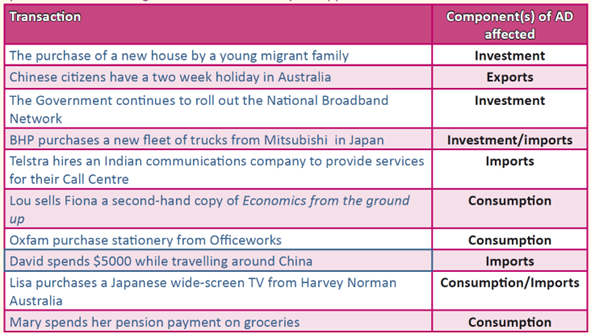Application Exercise 6a:

An decrease in tax rates on personal income: AD and economic activity are likely to increase because household disposable income rises which enables people to spend more money on goods and services, typically consumption. [The extent of the rise in AD will depend on the proportion of consumption expenditure that is spent on imports, with greater import spending (e.g. spending some of the increased disposable income on a holiday in Bali) limiting the growth in AD.]
Growth in the competitiveness of Chinese producers: AD and economic activity are likely to decrease because imports from China are likely to increase at the expense of sales from Australian import competing producers.
A decision by the Government to reduce all welfare payments by 20%: AD and economic activity are likely to decrease because the disposable income of many Australian households will fall, which reduces consumption demand.
An ageing population affecting the size of the labour force: AD and economic activity are likely to decrease because a smaller labour force (or labour supply) will tend to increase the costs of labour, increase prices and reduce Australia’s international competitiveness. This in turn leads to a reduction in net export (X – M) demand.
A loss of confidence in the financial sector: On the one hand, AD and economic activity are likely to be affected in a positive way because householders and businesses will reduce savings within the financial system. To the extent that the funds are not saved in some other form (e.g. stored under mattresses J), is likely to increase both consumption and investment. On the other hand, the loss of confidence might spread to reduce consumer and business confidence more generally, which will have a negative impact on both consumption and investment.
A rise in efficiency levels within Australia’s export sector: AD and economic activity are likely to increase because the international competitiveness of exporters is likely rise, given the greater efficiency levels should translate into lower prices, which increases the net export component of AD.
A fall in the household savings ratio: AD and economic activity are likely to increase, particularly in the short term, because lower savings translates into greater spending (assuming that income levels remain unchanged) on consumption and investment. [In the long term, lower savings today has negative implications for investment and AD.]
